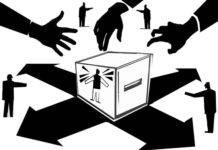Nauyen Tan Dung
The Asia-Pacific region now enjoys dynamic development and is home to the three biggest economies and many emerging ones of the world. Here, the trend of multi-layer and multi-sector cooperation and linkages is evolving vigorously and becomes the prevailing one of the day. However, looking back at the full picture of the region in the past years, we cannot fail to be concerned over the simmering risks and challenges to peace and security.
Competition and engagement are by themselves normal facts in the course of cooperation and development. Yet if such competition and engagement embrace calculations only in one’s own interest, without equality, respect of international law and transparency, then strategic trust could in no way be reinforced, and there could be a chance for the rise of division, suspicion and the risk of mutual containment, thus adversely affecting peace, cooperation and development.
The unpredictable developments in the Korean Peninsula; sovereignty and territorial disputes from the East China Sea to the East Sea that are evolving with much complexity, threatening regional peace and security, firstly maritime security and safety as well as the freedom of navigation, have indeed caused deep concerns to the international community. Somewhere in the region, there have emerged preferences for unilateral might, groundless claims, and actions that run counter to international law and stem from imposition and power politics.
All will lose in armed conflicts
If this region falls into instability and especially, armed conflicts, in general there will be neither winner nor loser. Rather, all will lose. Suffice it to say, therefore, that working together to build and reinforce strategic trust for peace, cooperation and prosperity in the region is the shared interest of us all. To build strategic trust, we need to abide ourselves by international law, uphold the responsibilities of nations, especially of major powers, and improve the efficiency of multilateral security cooperation mechanisms. In today’s civilized world, the UN Charter, international law and the universal principles and norms serve as the entire mankind’s common values that must be respected. This also represents the precondition for strategic trust building. ASEAN could only be strong and able to build on its role when it is united as one. An ASEAN lacking unity will by itself, lose its stand and will not be in the interest of any country, even ASEAN member states or its partners. We need an ASEAN united and strong, cooperating effectively with all countries to nurture peace and prosperity in the region, not an ASEAN in which member states are forced to take side with one country or the other for the individual benefit of their own in the relations with big powers. We have the responsibility to multiply trust in the settlement of problems, enhance cooperation for mutual benefit, combine harmoniously our national interest with that of other nations and of the whole region.
When it comes to the issue of the East Sea, ASEAN and China have travelled a long way with no less difficulty to come to the Declaration on the Conduct of Parties in the East Sea (DOC). ASEAN and China have agreed to work towards a Code of Conduct in the East Sea (COC). Parties need to uphold their responsibilities, mutually reinforce strategic trust, first and foremost by strictly implementing the DOC and doubling efforts to formulate a COC that conforms to international law and in particular, the 1982 UN Convention on the Law of the Sea (UNCLOS).
ASEAN and maritime security
I believe, ASEAN and its partners can work together to develop a feasible mechanism that could guarantee maritime security and safety and freedom of navigation in the region.
Vietnam’s foreign policy desire is to establish strategic partnerships with all the permanent members of the UN Security Council once the principles of independence, sovereignty, non-interference in the internal affairs of each other, mutual respect, equal and mutually beneficial cooperation are committed and seriously implemented. Vietnam has decided to participate in UN peacekeeping operations, first in such areas as military engineering, military medicine and military observation.
Vietnam’s defence policy is that of peace and self-defence. Vietnam will not be a military ally to any country and will not allow any country to set up military bases on Vietnamese territory. Vietnam will not ally itself with any country to counter another. Vietnam’s army modernization is only for self-defense and the safeguard of our legitimate interests. It does not, in any way target any other country.
With regard to the present threats and challenges to regional security such as the Korean Peninsula, the East China Sea and the East Sea, Vietnam perseveres to the principle of peaceful dispute settlement on the basis of international law, respecting the independence, sovereignty and the legitimate interests of each other. All parties concerned need to exercise self-restraint and must not resort to force or threat to use force. Once again, Vietnam reiterates its consistent compliance with the ASEAN Six-point Statement on the South China Sea and will do its utmost to work together with ASEAN and China to seriously observe the DOC and soon arrive at the COC. As a coastal State, Vietnam reaffirms and defends its legitimate rights and interests in accordance with international law, especially the 1982 UNCLOS.
Abridged from the keynote speech of Mr. Nguyen Tan Dung, Prime Minister of Vietnam at 12th Shangri-La Dialogue, Singapore, May 31, 2013.
Source: Weekly Holiday









